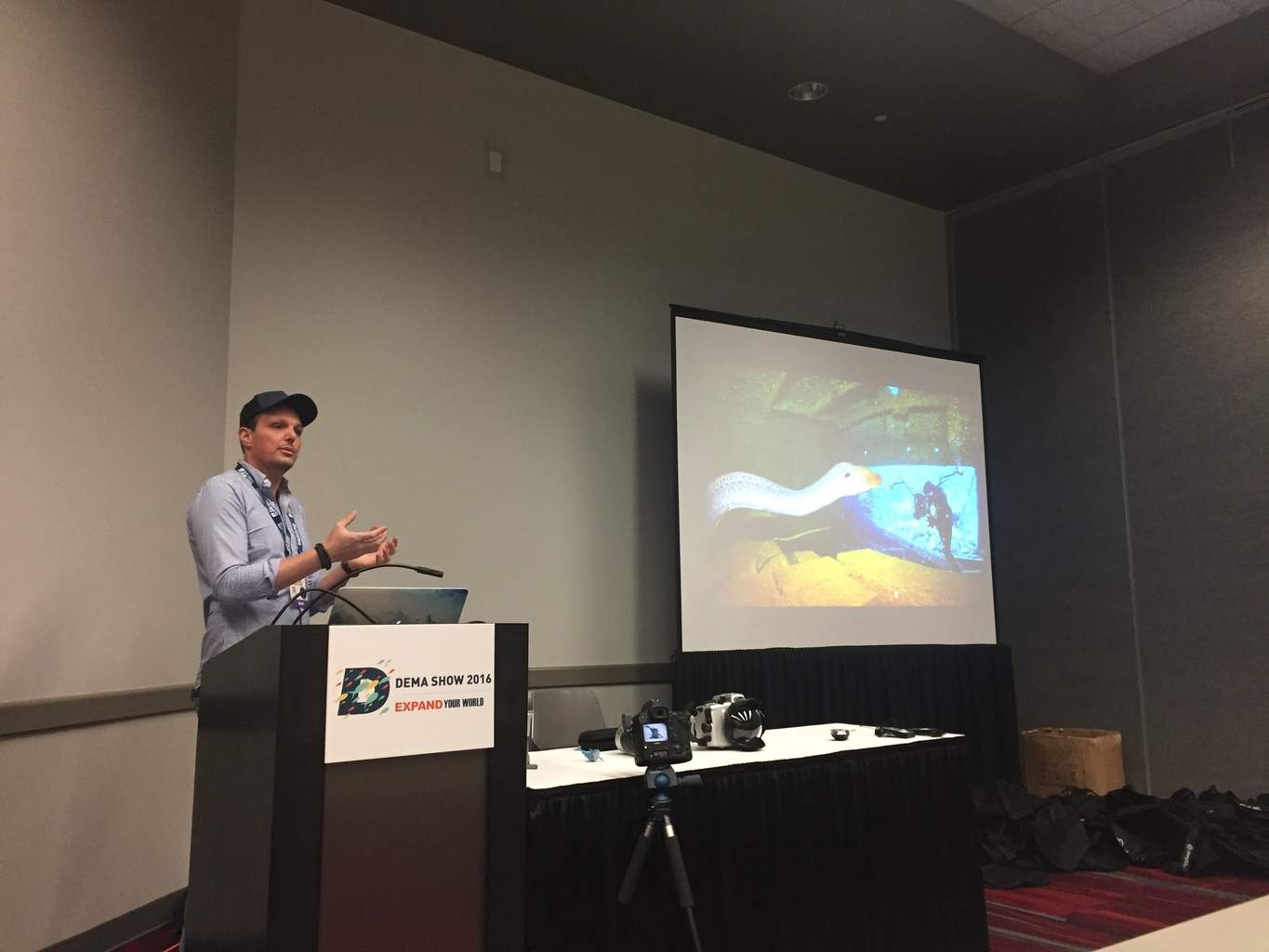News
Tobias Friedrich: Painting with Light Underwater
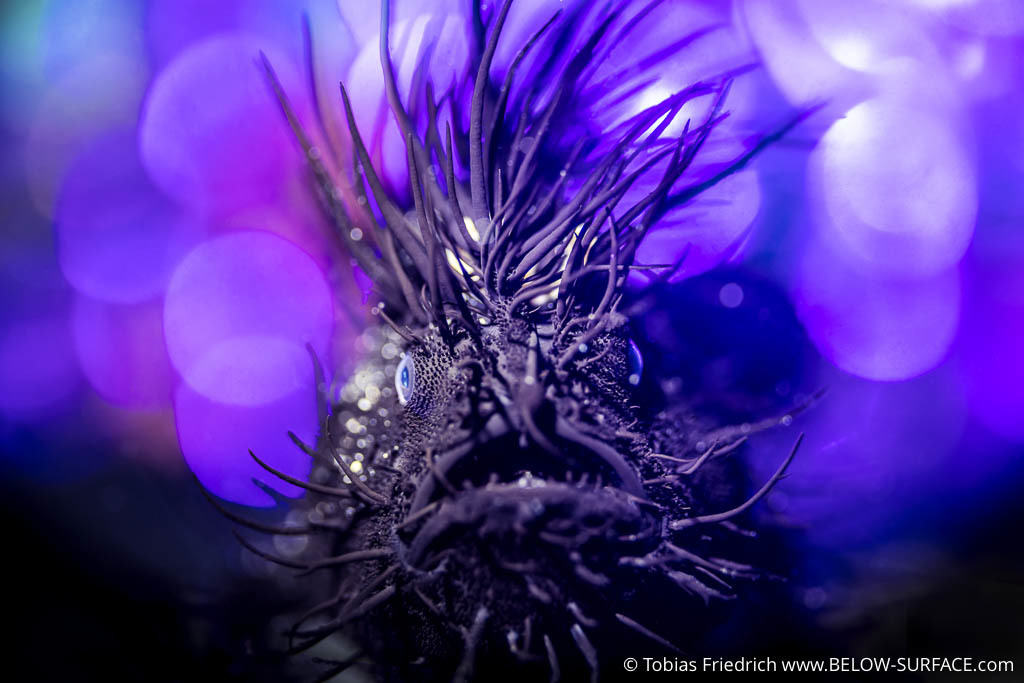
Getting the light right is imperative for all types of photography, but in underwater photography it can single-handedly make or break an image. Professional underwater photographer Tobias Friedrich revealed his secrets at the Deepblu Expert Spotlight Sessions at DEMA 2016 in Las Vegas.
In his seminar Painting with Light in Underwater Photography, Friedrich used case studies to show how he created his own images, illustrated key lessons and shared scores of useful tips and techniques for controlling the light in underwater photography with the audience.
The Challenges of Light Underwater
“To produce truly stunning images, photographers must understand the basic principles of how light behaves underwater,” explained Friedrich. Balancing both the amount and direction of light is key, as it determines which parts light up, how much backscatter appears, or whether shadows are created.
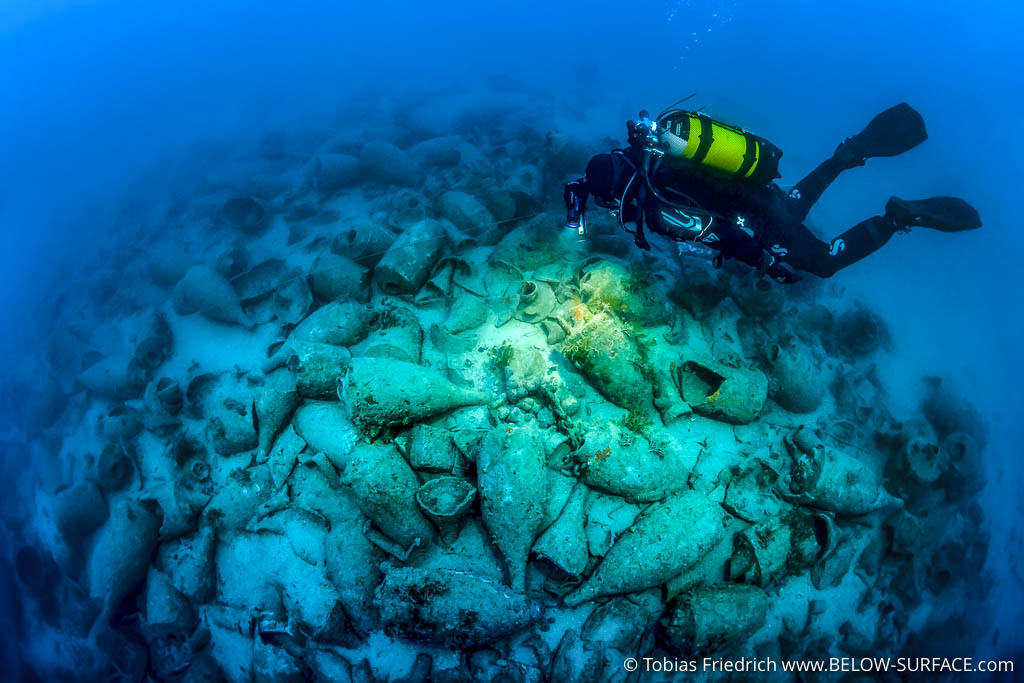
The only source of light for this image was the dive torch of the diver, which is illuminating the amphorae on this ancient Roman wreck in the Mediterranean Sea near Loano, Italy.
Underwater photographers must also master mixed lighting; that is, the combination of natural and artificial light. Light is absorbed in much greater amounts by water than by air. Especially at deeper depths, the sun’s rays do not provide enough light to produce aesthetically-pleasing images, and diver-photographers must use artificial light sources to compensate for the natural light that is lost to absorption.
Working with Strobes
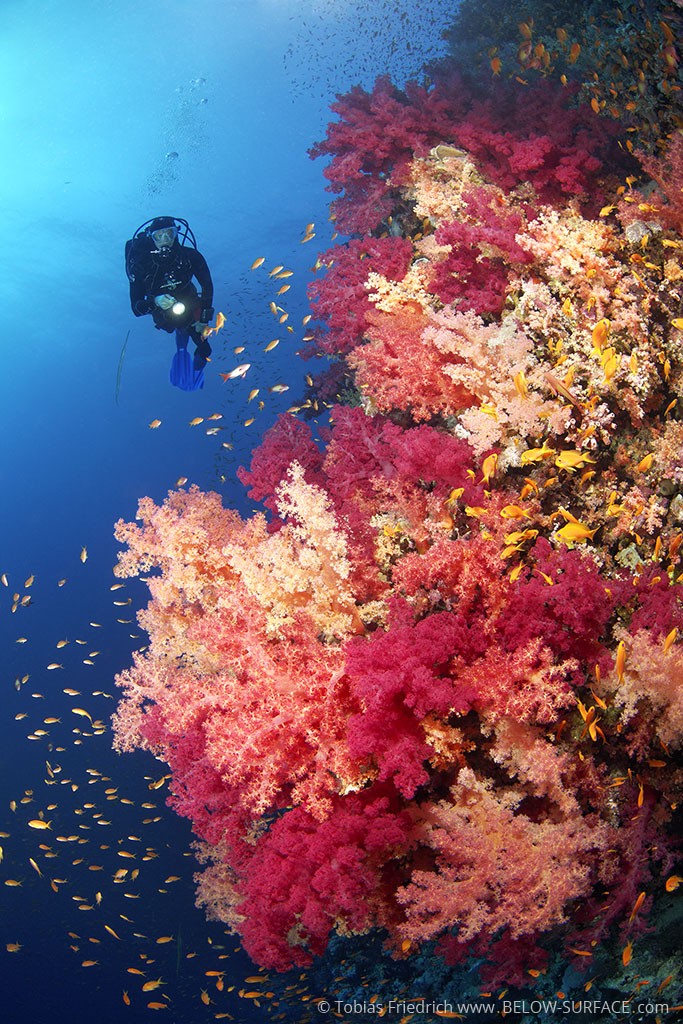
“Artificial strobes and the light of a buddy’s dive torch were used to bring out the colors of the red, yellow and orange soft corals in this photo taken at the Brother Islands, Red Sea, Egypt.
The most generic tools for introducing artificial light to underwater photography come in the form of strobes. External strobes are attached directly to the camera or its housing, while slave strobes can be placed in different places and activated using either an electrical cord or optical sensors. How many strobes you use depends entirely on your goal: one strobe is good if you only want to light up part of a picture, whereas two strobes are usually powerful enough to light up the entire scene.
Friedrich also suggested experimenting with a slave strobe set up on a flexible tripod, as light from a strategically-placed strobe provides more depth of field. “You don’t always need to limit yourself to strobes,” he said. “There are other options, such as your buddy’s dive torch, a video light and, of course, the sun’s rays.”
Working with Natural Light
Friedrich encouraged photographers to let the sun do part of the work as well by shooting against the sun. According to Friedrich, these shots can be done best in the early mornings or late afternoons. At these times, most of the sun’s rays reflect off the water surface and only some rays get through, providing ideal lighting conditions and preventing images from getting ‘burned out’.
“You may have to get a little creative in order to catch the right moment,” Friedrich suggests. “Many dive operators have fixed sailing times but often you can work out a deal so they take you out in the lighting conditions you desire.”
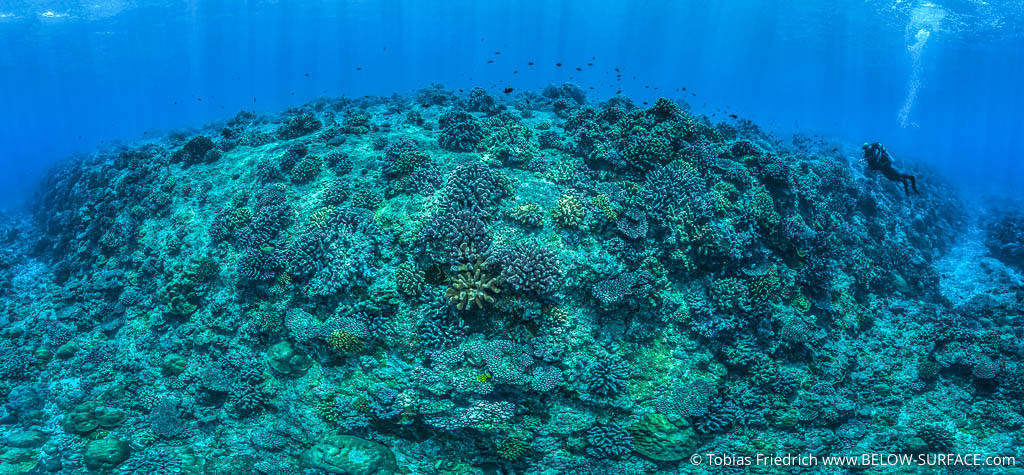
Natural light from the sun is all it took to light up this panoramic view of a hard coral reef at Christmas Island in the Indian Ocean.
Try, Try and Try Again
“Photographers must always be thinking about what can be adjusted to make improvements,” said Friedrich. “Should I change the angle of the camera? Would getting closer or farther from my subject make a difference? What position should strobes be in and how should I set the settings? Does this scene need background lighting?” Moreover, you don’t always have the luxury of a captive subject. It takes a lot of practice to set up your gear in time to capture a fast-moving subject.
“Most published images are the result of a process of trial and error,” Friedrich concluded. “Even the most experienced photographers take countless images before getting it even close to right. Snap a photo; see how it turned out; make a small adjustment; then take another shot. If you think you’re satisfied with your picture, try even harder, and you will get a better image every time..”
About Tobias Friedrich
Tobias Friedrich is an award-winning German underwater photographer whose images have appeared in countless online magazines and other publications, including Red Bull, BBC, The Times, Scuba Diving Magazine, and US Sport Diver. Countless underwater photographic competitions such as Smithsonian’s Ocean Views, Ocean Art, Epson Red Sea, Beneath the Sea, and Celebrate the Sea have honored his work. Tobias is always keen to take up new challenges and loves to experiment with new, creative ways to create the best underwater images.
Learn more about Tobias at www.below-surface.com.
 Deepblu is a diving technology company which has created the first social network for scuba divers, freedivers, underwater photographers and other ocean-lovers. Deepblu also produces the COSMIQ+ Dive Computer. Divers wanting to give Deepblu a shot can try it out today at deepblu.com, and those interested in the COSMIQ+ Dive Computer can go to about.deepblu.com/cosmiq.
Deepblu is a diving technology company which has created the first social network for scuba divers, freedivers, underwater photographers and other ocean-lovers. Deepblu also produces the COSMIQ+ Dive Computer. Divers wanting to give Deepblu a shot can try it out today at deepblu.com, and those interested in the COSMIQ+ Dive Computer can go to about.deepblu.com/cosmiq.
News
Book Review: Fire on Monroe Bravo by Fred Lockwood

Fire on Monroe Bravo is the latest book in the Jack Collier series by Fred Lockwood. Our story begins with our lead characters, Jack and Sandro, owners of Marine Salvage & Investigation Company, arriving on the Monroe Bravo Oil & Gas Platform in the North Sea. Having secured a contract for their vessel the MV Stavanger to act as support ship to the platform for TransGlobal Oil, our protagonists are on a celebratory visit.
However almost as soon as they arrive a series of explosions rock the platform, causing huge damage, loss of life and the very real danger of a massive human, ecological and financial disaster.

As the danger mounts for both our heroes and the surviving workers, Jack and Sandro will have to escape the inferno, all while trying to save the platform and the men still trapped unable to help themselves.
The disaster sets the scene for the unfolding story lines following the fate of the platform and our main characters, the police investigation into a suspected terrorist act and the actions of TransGlobal Oil as they attempt to navigate the pubic outcry and financial repercussions.
In his eighth book, Fire on Monroe Bravo, Fred Lockwood delivers an explosive thriller, with plenty of above and in-water drama, and our heroes fighting for survival, what more can you ask for?
We thoroughly recommend this read and look forward to the next in the series. For more information about his book series, you can check out the reviews of his previous books here on Scubaverse.
- Title: Fire On Monroe Bravo
- Author: Fred Lockwood
- ISBN: 979-8325324536
Available in a paperback version and for Kindle from Amazon and book stores.
Blogs
Alonissos: The complete diving destination (Part 1)

In June we were incredibly fortunate to be invited to dive in Alonissos, a small Greek Island in the Sporades island chain located in the North Aegean Sea. While I have long been a big fan of the Greek Islands as a great holiday destination, I had not had the opportunity to do any diving on previous visits and Mike and I were extremely excited to see what Alonissos had to offer both above and below the surface!

The Sporades are easily accessible via the airport in Skiathos (the first island in the chain), which is served by Jet2 flights from all major UK airports from May through October. Numerous ferries and charter boats make island hopping from Skiathos Town a breeze. After an hour boat ride, the picturesque port of Patitiri was a wonderful introduction to Alonissos, where we were met by our gracious hosts Kostas of Albedo Travel and Dias of Alonissos Triton Dive Center. Mike and I were delighted to be staying at the Paradise Hotel, aptly named for its stunning views over the sea and great location for walking to the waterfront.

Alonissos is beautifully situated in the National Marine Park of Alonissos and the Northern Sporades, the largest marine protected area in Europe. The surrounding seas offer fabulous marine life, including incredibly rare species such as the Mediterranean monk seal. They boast deep walls covered in gorgonians and sponges, stunning topography with caverns, swimthroughs and pinnacles, and the first accessible ancient shipwreck from 500BC!

In locations where historical sites have been reported, the waters are largely restricted, but with collaboration between government, underwater archeologists and dive centres, incredible underwater museums are being created for a truly unique diving experience. Alonissos is home to the first of these, the Ancient Shipwreck of Peristera Accessible Underwater Archeological Site. The chance to dive into history (along with reports of healthy reef life and amazing underwater topography) meant Mike and I were keen to get in the water.

Our introduction to the diving around Alonissos was at the Agios Georgios Pinnacles, in the channel between Alonissos and Skopelos. This fantastic site was named “The Chimney,’ and proved to have a huge amount to see. We got to a decent depth here (over 25m), and marvelled at a colourful reef wall with a wonderful swim through whose rocky walls were absolutely covered with life. As well as brilliant topography there was no shortage of macro life here. We saw numerous nudibranchs, five different species in total. The second dive at Mourtias reef nearby was a shallower dive along a nice wall with lots of crevices. Several moray eels and grouper called this site home. We enjoyed looking in the crevices for lobster and smaller benthic life, such as cup corals and tunicates.

Our itinerary allowed us two dives a day with afternoons left to explore the island with our hire car and evenings to enjoy the famous Greek hospitality. This proved to be a lovely mix of in-water and land based diversions.

The next days diving to the Gorgonian Gardens and Triton’s Cave was to be even better! These two stunning sites are nothing short of fabulous. The Gorgonian Gardens was a deep wall near to the Agios Georgios islands. The ever-present currents in this deep channel meant that the sea life was amazing … the namesake Gorgonian sea fans dotted the wall at a depth of 30 to 50 meters, getting ever larger the deeper we went. Above 30m was by no means less beautiful, with sponges, corals, scorpionfish, moray eels and some rare and colourful nudibranchs.

The second shallower dive of the day was to Triton’s Cave or the Cavern of Skopelos, on the east side of that island. The spectacular rock formations had wild striations both above and below the water making a truly epic topography. The cavern entrance was at 14m, and big enough for a buddy pair, winding up to 6m and passing two beautiful windows out into the blue. Emerging from the cavern, the light at the shallower depths and the incredible rock formations made for a fantastic gentle swimming safety stop and we all surfaced by the boat with massive grins.

Check out our next blog :Alonissos: The complete diving destination (Part 2)” to hear about our amazing dive on the 2500 year old Peristera Wreck!
Thanks to:
Alonissos Triton Dive Center https://bestdivingingreece.com/
Albedo Travel https://alonissosholidays.com/activities/
Paradise Hotel https://paradise-hotel.gr/
Alonissos Municipality https://alonissos.gr/en/
-

 Blogs2 months ago
Blogs2 months agoDiving With… Nico, Ocean Earth Travels, Indonesia
-

 News1 month ago
News1 month agoMurex Bangka Announce New Oceanfront Cottages & Beachfront Dining
-

 Blogs2 months ago
Blogs2 months agoA new idea in freediving from RAID
-

 Marine Life & Conservation1 month ago
Marine Life & Conservation1 month agoIceland issue millionaire whale hunter a licence to murder 128 vulnerable fin whales
-

 Marine Life & Conservation2 months ago
Marine Life & Conservation2 months agoThe Shark Trust Great Shark Snapshot is back
-

 News3 months ago
News3 months agoCharting New Waters; NovoScuba Goes Global with the Launch of their Revolutionary Dive Training Agency!
-

 Gear News1 month ago
Gear News1 month agoNew Suunto Ocean – a dive computer and GPS sports watch in one for adventures below and above the surface
-

 Marine Life & Conservation Blogs2 months ago
Marine Life & Conservation Blogs2 months agoBook Review: Plankton


